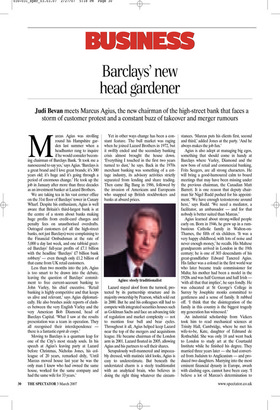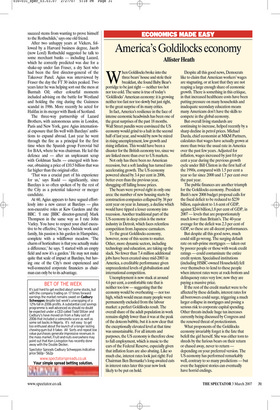Barclays’ new head gardener
Judi Bevan meets Marcus Agius, the new chairman of the high-street bank that faces a storm of customer protest and a constant buzz of takeover and merger rumours Marcus Agius was strolling round his Hampshire garden last summer when a headhunter rang to inquire if he would consider becoming chairman of Barclays Bank. ‘It took me a nanosecond to say yes,’ says Agius. ‘Barclays is a great brand and I love great brands; it’s 300 years old; it’s huge and it’s going through a period of enormous change.’ He took up the job in January after more than three decades as an investment banker at Lazard Brothers.
We are taking tea in his vast corner office on the 31st floor of Barclays’ tower in Canary Wharf. Despite his enthusiasm, Agius is well aware that Britain’s third-largest bank is at the centre of a storm about banks making huge profits from credit-card charges and penalty fees on unauthorised overdrafts. Outraged customers (of all the high-street banks, not just Barclays) were complaining to the Financial Ombudsman at the rate of 5,000 a day last week, and one tabloid greeted Barclays’ full-year profits of £7.1 billion with the headline ‘Barclays’ £7 billion bank robbery’ — even though only £1.2 billion of that came from UK retail customers.
Less than two months into the job, Agius is too smart to be drawn into the debate, leaving the question of Barclays’ commitment to free current-account banking to John Varley, his chief executive. ‘Retail banking is highly competitive and that keeps us alive and relevant,’ says Agius diplomatically. He also brushes aside reports of clashes between the very English Varley and the very American Bob Diamond, head of Barclays Capital. ‘What I saw at the results presentation was a team in operation. They all recognised their interdependence there is a fantastic esprit de corps.’ Moving to Barclays is a quantum leap for one of the City’s most steady souls. In his speech at Agius’s leaving party at Lazard before Christmas, Nicholas Jones, his colleague of 20 years, remarked drily, ‘Until Marcus moved house last year he was the only man I knew who had owned the same house, worked for the same company and had the same wife for 33 years.’ Yet in other ways change has been a constant feature. The bull market was raging when he joined Lazard Brothers in 1972, but it swiftly ended and the secondary banking crisis almost brought the house down. ‘Everything I touched in the first two years turned to dust,’ he says. Back in the 1970s merchant banking was something of a cottage industry, its advisory activities strictly separated from lending and share trading. Then came Big Bang in 1986, followed by the invasion of Americans and Europeans who snapped up British stockbrokers and banks at absurd prices.
Lazard stayed aloof from the turmoil, protected by its partnership structure and its majority ownership by Pearson, which sold out in 2000. But he and his colleagues still had to compete with integrated securities houses such as Goldman Sachs and face an advancing tide of regulation and market complexity — not to mention four bull and bear cycles. Throughout it all, Agius helped keep Lazard near the top of the mergers and acquisitions league. He became chairman of the London arm in 2001. Lazard floated in 2005, allowing Agius and his partners to sell their shares.
Scrupulously well-mannered and impeccably dressed, with matinée idol looks, Agius is easy to underestimate. But beneath the understated charm is a steely traditionalist with an analytical brain, who believes in doing the right thing whatever the circum stances. ‘Marcus puts his clients first, second and third,’ added Jones at the party. ‘And he always makes the job fun.’ Agius is also adept at managing big egos, something that should come in handy at Barclays where Varley, Diamond and the new boss of retail and commercial banking, Frits Seegers, are all strong characters. He will bring a good-humoured calm to board meetings that may have been missing under the previous chairman, the Canadian Matt Barrett. It is one reason that deputy chairman Sir Nigel Rudd pushed for his appointment. ‘We have enough testosterone around here,’ says Rudd. ‘We need a mediator, a facilitator, an ambassador — and for that nobody is better suited than Marcus.’ Agius learned about strong-willed people early on. Born in 1946, he grew up in a rumbustious Catholic family in Walton-onThames, the fifth of six children. ‘It was a very happy childhood, with lots of noise and never enough money,’ he recalls. His Maltese grandparents arrived in London in the 19th century; he is one of 303 descendants of his great-grandfather Edward Tancred Agius. His father was a colonel in the first world war who later became trade commissioner for Malta; his mother had been a model in the 1920s and was half German and half Irish — ‘with all that that implies’, he says fondly. He was educated at St George’s College in Surrey by Josephite monks committed to gentleness and a sense of family. It rubbed off. ‘I think that the disintegration of the family in this country is the biggest tragedy my generation has witnessed.’ An industrial scholarship from Vickers took him to read mechanical sciences at Trinity Hall, Cambridge, where he met his wife-to-be, Kate, daughter of Edmund de Rothschild. She was only 18 and went back to London to study art at the Courtauld Institute while he finished his degree. They married three years later — she had converted from Judaism to Anglicanism — and produced two daughters. Marrying into the most eminent financial dynasty in Europe, awash with clashing egos, cannot have been easy. ‘I believe a lot of Marcus’s determination to succeed stems from wanting to prove himself to the Rothschilds,’ says one old friend.
After two unhappy years at Vickers, followed by a Harvard business degree, Jacob (now Lord) Rothschild suggested he talk to some merchant banks — including Lazard, which he correctly predicted was due for a shake-up under Ian Fraser, a dry Scot who had been the first director-general of the Takeover Panel. Agius was interviewed by Fraser the day the FT 30 index peaked. Two years later he was helping sort out the mess at Burmah Oil; other colourful moments included advising on the battle for Westland and holding the ring during the Guinness scandal in 1986. More recently he acted for Halifax in its merger with Bank of Scotland.
The three-way partnership of Lazard Brothers, with autonomous arms in London, Paris and New York, gave Agius international exposure that fits well with Barclays’ ambitions to expand abroad. Last year he went through the fire as a principal for the first time when the Spanish group Ferrovial bid for BAA, where he was chairman. He led the defence and — after an unpleasant scrap with Goldman Sachs — emerged with honour, obtaining a price of £10.5 billion that was far higher than the original offer.
‘That was a crucial part of his experience for us,’ says Rudd — significantly, since Barclays is so often spoken of by the rest of the City as a potential takeover or merger candidate.
At 60, Agius appears to have segued effortlessly into a new career at Barclays — plus non-executive roles at Kew Gardens and the BBC. ‘I rate [BBC director-general] Mark Thompson in the same way as I rate John Varley. You have to respect your chief executive to be effective,’ he says. Outside work and family, his passion is his garden in Hampshire, complete with a wildflower meadow. ‘The charm of horticulture is that you actually make a difference,’ he says. ‘I started with an empty field and now it’s a garden.’ He may not make quite that scale of impact at Barclays, but having one of the City’s most experienced and well-connected corporate financiers as chairman can only be to its advantage.











































































 Previous page
Previous page